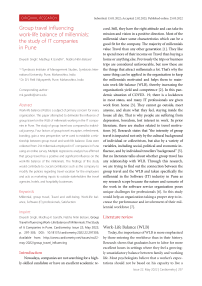Group travel influencing work-life balance of millennials: the study of IT companies in Pune
Автор: Singh D., Gandhi M.K., Belsare N.N.
Журнал: Cardiometry @cardiometry
Рубрика: Original research
Статья в выпуске: 22, 2022 года.
Бесплатный доступ
Work-life balance (WLB) is a subject of primary concern for every organization. This paper attempted to delineate the influence of group travel on the WLB of millennials working in the IT companies in Pune. The study of group travel was compared to individual journeys. Four factors of group travel: escapism, refreshment, bonding, gain a new perspective; we’re used to establish a relationship between group travel and work-life balance. Data were collected from 214 millennials employed in IT companies in Pune using an online survey. Multiple regressions analysis has affirmed that group travel has a positive and significant influence on the work-life balance of the millennials. The findings of this study would contribute to crucial contributors such as the company to modify the policies regarding travel vacation for the employees and acts as marketing inputs to outside stakeholders like travel agencies, hotels, and hospitality businesses.
Millennial, group travel, travel and well-being, work-life balance, software (it) professionals, satisfaction
Короткий адрес: https://sciup.org/148324609
IDR: 148324609 | DOI: 10.18137/cardiometry.2022.22.297305
Текст научной статьи Group travel influencing work-life balance of millennials: the study of IT companies in Pune
Divyesh Singh, Madhup K Gandhi, Nabha Nitin Belsare. Group Travel Influencing Work-Life Balance of Millennials: The Study of It Companies in Pune. Cardiometry; Issue 22; May 2022; p. 297-305; DOI: 10.18137/cardiometry.2022.22.297305; Available from:
Nowadays, companies are not searching for a highly-skilled candidate or have an excellent academic re- cord. Still, they have the right attitude and can take its mission and vision in a positive direction. Most of the millennial share some characteristics which can be a good fit for the company. The majority of millennials value Travel than any other generation [1]. They like to spend more of their income on Travel than buying a home or anything else. Previously the trips or business trips are considered unfavourable, but now these are the things that attract millennials a lot. That’s why the same thing can be applied in the organization to keep the millennials motivated and helps them to maintain work-life balance (WLB), thereby increasing the organization’s yield and competence [2]. In this pandemic situation of COVID- 19, there is a lockdown in most states, and many IT professionals are given work from home [3]. They cannot go outside, meet anyone, and share what they feel, staying inside the house all day. That is why people are suffering from depression, boredom, lost interest in work. In prior literature, there are studies related to travel motivations [4]. Research states that “the intensity of group travel is impacted not only by the cultural background of individual or collectivism, but also by a variety of variables, including social, political and economic influence, and by individual travellers’ background” [5]. But no literature talks about whether group travel has any relationship with WLB. Through this research, we are trying to find out the connection between the group travel and the WLB and taken specifically the millennial in the Software (IT) industry in Pune as my research scope because the nature and scenario of the work in the software service organization poses unique challenges for professionals [6]. So this study would help an organization taking a proper step to increase the performance and involvement of their millennial workforce [7].
Список литературы Group travel influencing work-life balance of millennials: the study of IT companies in Pune
- Pune’s IT sector is booming, resulting in an exponential rise in housing demands. (2016, October 24). Retrieved from Outlook Money: https://www.outlookindia.com/outlookmoney/fixed-assets/pune-thequeen-of-deccan-842
- P. Cappelli and K. Chauvin, “An interplant test of the efficiency wage hypothesis,” The Quarterly Journal of Economics, (1991).
- S. Cha, K. W. McCleary and M. Uysal, “Travel motivations of japanese overseas travelers: a factor-cluster segmentation approach”, Journal of travel research, pp. 33-39, (1995).
- A. E. Clark and A. J. Oswald, “Satisfaction and comparison income,” Journal of Public Economics, pp. 359-381, (1996).
- G. M. Dann, “Anomie, ego-enhancement and tourism,” Annals of Tourism Research, (1977).
- R. L. Dhar, “Employees’ perception of organizational support: A qualitative investigation in the Indian information technology (IT) industry,” IOS Press, pp. 211-222, (2012).
- R. Eisenberger, V. Davis-LaMastro and P. Fasolo, “Perceived organizational support and employee diligence, commitment, and innovation,” Journal of Applied Psychology, pp. 51-59, (1990).
- S. K. Ethiraj, J. V. Singh, P. Kale and M. S. Krishnan, “Where do capabilities come from and how do they matter? A case in the software services industry,” Strategic Management Journal, pp. 25-45, (2005).
- D. Gilbert and J. Abdullah, “Holiday taking And The Sense Of Well-Being,” Annals of Tourism Research, pp. 103-121, (2004).
- J. F. Hair Jr, W. C. Black, B. J. Babin and R. E. Anderson, “Multivariate data analysis (7th ed.),” United States of America, United States of America: Pearson, (2010).
- S. Jang and L. A. Cai, “Travel motivations and destination choice: A study of British outbound market,” Journal of travel and tourism marketing, pp. 111-133, (2002).
- K. Jnaneswar, “Relationship between work-life balance, turnover intension, and organizational support for work-life balance: A study in the IT industry in Kerela,” Prabandhan: Indian Journal of Management, pp. 33-44, (2016).
- T. Kalliath and P. Brough, “Work-life balance: A review of the meaning of the balance construct,” Journal of Management & Organization, pp. 323-327, (2008).
- J. Rauch, “The world in 2019: Generation next,” The Economist Readership, (2019).
- V. Saravanabavan, “Bicycle and health: A geo-medical study of Madurai City,” Transactions of the Institute of Indian Geographers, pp. 31-37, (1997).


